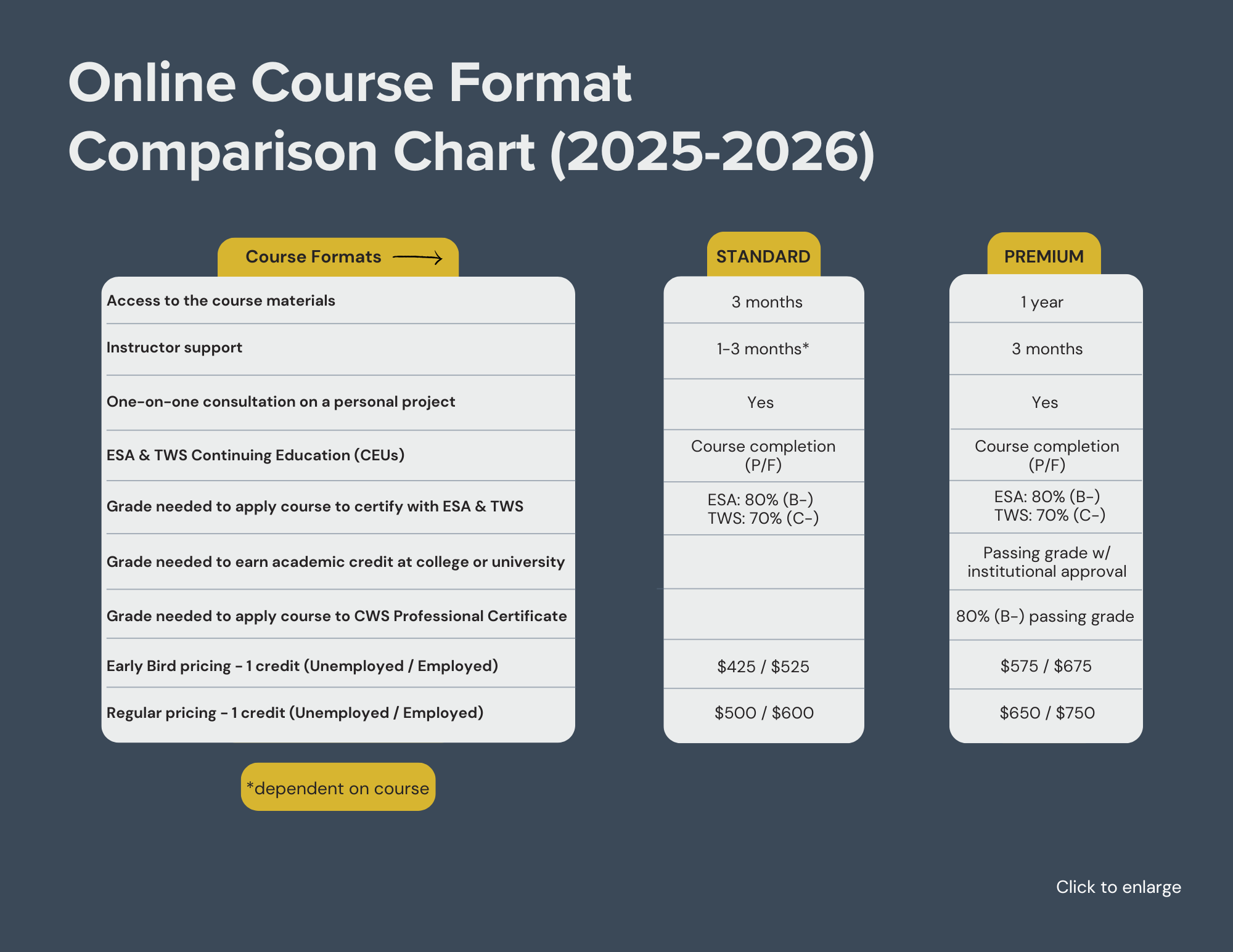-
The use of camera traps in wildlife research and management has grown dramatically in recent years as camera trap technology and analytical approaches continue to develop. This course will cover all aspects of camera trapping in wildlife studies: from camera trap selection to analytical approaches. Students will review the history and development of camera trapping as a tool for wildlife studies, examine variations in camera trap technologies, and explore various study designs, camera trap placements, data management software, and analytical approaches. Using case studies, students will learn about the unique benefits and challenges of camera trapping in various habitats: from temperate to tropical, arboreal to aquatic.
-
Summer: June 1 – August 23, 2026 (Early bird ends May 3rd)
-
None.
This course is recommended for those interested in taking Occupancy Modeling or Computer Vision.
-
History, current status, and the future of camera trapping in wildlife studies
Study design examples and considerations
Camera trap models & technologies
Camera placement and logistics in the field
Photo management: from field to data
Artificial Intelligence image recognition
Photo tagging and data management, including exploring Camelot, Zooniverse, CamtrapR, and Wildlife Insights
Analysis of camera trap data – considerations, limitations, and examples
Tapping into existing data
Development and sharing (photo management platform, and photo tagging fields and management)
COURSE OPTIONS & INFORMATION (Review chart above, then click below)
-
FORMAT:
3 months of access to course materials as you work at your own pace
Get instructor support for 5 weeks via email, discussion threads, group meetings, and one-on-one appointments
After working through the course materials, set up an optional meeting with the instructor to discuss your own personal project from work or school
CONTINUING EDUCATION:
16 CEUs with The Wildlife Society
4 CEUs in Category I(a): Scientific Education and Training with the Ecological Society of America
Go to our Continuing Education Page for more details
CERTIFICATIONS:
Earn 1 credit toward certification as an Associate/Certified Wildlife Biologist® (at any level) with The Wildlife Society
DATES & PRICES:
Winter: Jan 6 - Feb 10, 2025 (with access to course materials until March 23): $425 student / $525 professional
*Early bird saves $75
-
FORMAT:
12 months of access to course materials as you work at your own pace
Get instructor support for 5 weeks via email, discussion threads, group meetings, and one-on-one appointments
After working through the course materials, set up an optional meeting with the instructor to discuss your own personal project from work or school
CONTINUING EDUCATION:
16 CEUs with The Wildlife Society
4 CEUs in Category I(a): Scientific Education and Training with the Ecological Society of America
Go to our Continuing Education Page for more details
CERTIFICATIONS:
Earn 1 credit toward certification as an Associate/Certified Wildlife Biologist® (at any level) with The Wildlife Society
Earn an additional 1-2 academic credits with an Applied Project
Go to our Academic Credit Page for details
DATES:
Winter: Jan 6 - Feb 10, 2025 (with access to course materials until March 23): $575 student / $675 professional
*Early bird saves $75
INSTRUCTOR
“Whether you are a seasoned Wildlife Biologist or this is your first project, you will gain considerable knowledge from Dr. Olson’s experience and expertise about using game cameras for research. He did a fantastic job of preparing me for my next research project, and answered all my questions during our one-on-one time together, which I consider the most valuable part of the course.”
Ben Simpson
Wildlife Resource Manager, Penobscot Nation, Maine
SCHOLARSHIPS
Full scholarships are available to participants from countries designated as “lower income” and “lower middle income” in the World Bank List of Economies. Please see our CWS World Scholars Program page for details.
CANCELLATION POLICY
Cancellations 30 days or more before the start date are not subject to cancellation fees. Cancellations <30 days before the start date are subject to a 50% cancellation fee. No refunds once the course begins.





